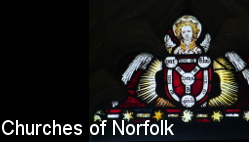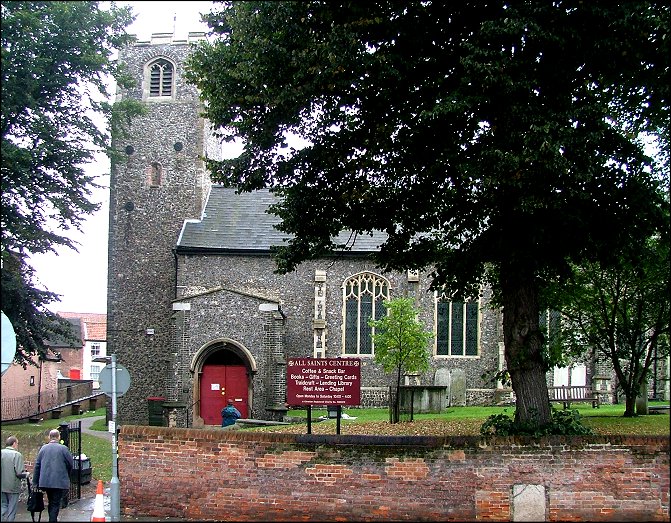| |
|
All
Saints, Norwich
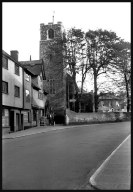 |
|
All
Saints sits rather shyly behind its trees in the
company with a few other old buildings at one end
of All Saints Green. Some of the excesses (though
by no means the worst) of Norwich's 1960s attempt
to become a kind of East Anglian Wolverhampton
glower inhumanely down to the south. The church
does well to ignore them. Amazingly, the
buildings to the west of the church survived both
the blitz and Norwich City Corporation, and the
view up Westlegate is substantially the same
today as it was in George Plunkett's 1938 shot on
the left. All Saints is a typical late-15th
century church on a small scale - a Norfolk
village church in the heart of the city. The
tower is patched up, the very top being from just
before the First World War, and the Victorians
are responsible for the rather run of the mill
'Decorated' east window.
|
| However,
All Saints was noteworthy for being one of the
most extreme Anglo-Catholic churches in a city
famous for them. It lasted until 1973, when the
reorganisation in the light of the Brooke report
led to its closure. Since then, All Saints has
been reinvented as a daytime drop-in centre, and
it is one of several similarly appropriate reuses
of a medieval church in the city. Volunteers
staff a cafe, library and rest area that is
widely used by passers-by, but is particularly
welcoming to the insecurely housed and
economically disadvantaged. It is a
Christian hospitality that should be practiced by
as many other churches as possible. All walks of
life meet here. The interior is homely without
being shabby, and the view to the east remains a
devotional one, as you can see by comparing
George Plunkett's 1938 photograph, and mine of
2005.
|
|
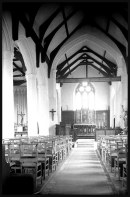 |
|
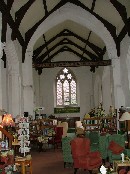 |
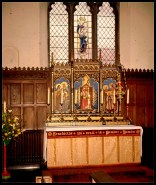 |
|
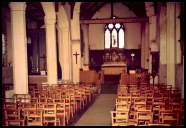 |
|
In the early 1970s,
shortly before redundancy, Roger Smith took the
two photographs on the left. The brightly
coloured Triptych above the altar featured Christ
in Majesty in the centre, with St Therese
of Lisieux, Mother Julian of Norwich and the
Blessed Virgin Mary on the left and .St Francis,
St Felix and St John Vianney on the right. It can
now be seen on the nave wall at East
Tuddenham. The image
of the Madonna and Child by Martin Travers in the
window above is now around the corner at St John
Timberhill. At the other end of the
church was once one of the city's most
spectacular fonts, with Saints arranged around
bowl and base. This went to St Julian to replace
the one destroyed by bombs there.
|
| Some
survivals of the Anglo-catholic past survive,
including a superb 1920s south nave window of the
crucifixion. Flanking angels hold the sun and the
moon, while angels at the base collect the
precious blood. There are medieval angels in the
upper lights of one of the north aisle windows. Everything
else has gone, although by way of recompense the
18th century wooden gallery from St Saviour came
here, and is now the base of the ringing chamber
and roof to the kitchens.
All
Saints has never been deconsecrated, and the
chancel has been reordered as a chapel. Come
and rest awhile, reads the reredos. This, of
course, is a central part of Christ's teaching
that is all too easily ignored by locked churches
and suspicious keyholders. But the kind ladies
staffing the kitchens here will have their
reward.
|
|
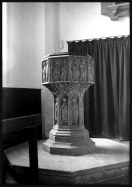 |
Simon Knott, November 2005
|
|
|
